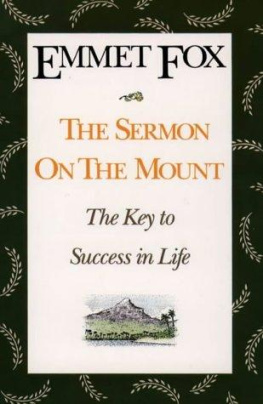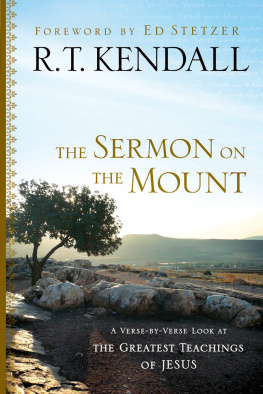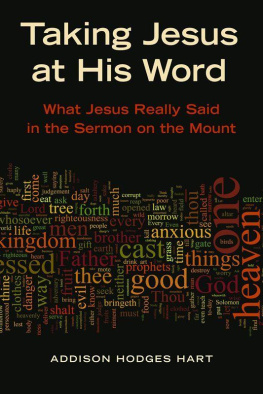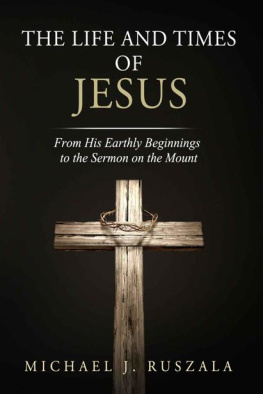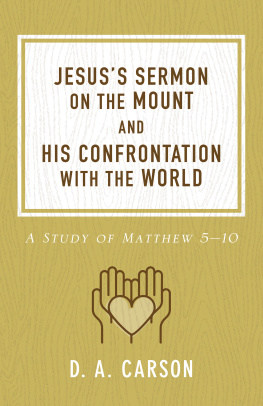To
My Students
in Great Britain and America
Who Have Been
the Inspiration and Encouragement
behind This Book
Contents
The Sermon on the Mount
What Did Jesus Teach?
The Beatitudes
As a Man Thinketh
Resist Not Evil
Treasure in Heaven
With What Measure Ye Mete
By Their Fruits
T HIS book is the distilled essence of years of Bible and metaphysical study, and of the many lectures I have delivered. It would have been easier to have made it twice its present length. My object, however, is to present the reader with a practical manual of spiritual development, and, with this end in view, I have condensed the subject matter into the smallest compass possible, because, as every student knows, conciseness of expression is of the greatest assistance in mastering any subject.
Do not imagine that you can assimilate all that it contains in one or two readings. It should be gone over again and again until you have thoroughly grasped the utterly new outlook upon life and the absolutely fresh scale of values which the Sermon on the Mount presents to mankind. Only then will you experience the New Birth.
The study of the Bible is not unlike the search for diamonds in South Africa. At first people found a few diamonds in the yellow clay, and they were delighted with their good fortune, even while they supposed that this was to be the full extent of their find.
Then, upon digging deeper, they came upon the blue clay, and, to their amazement, they then found as many precious stones in a day as they had previously found in a year, and what had formerly seemed like wealth faded into insignificance beside the new riches.
In your exploration of Bible Truth, see to it that you do not rest satisfied in the yellow clay of a few spiritual discoveries, but press on to the rich blue clay underneath. The Bible, however, differs from the diamond field in the sublime fact that beneath the blue clay there are more and still more and richer strata, awaiting the touch of spiritual perceptionon and on to Infinity.
As you read the Bible, you should constantly affirm that Divine Wisdom is enlightening you. That is the way to get direct inspiration.
I have followed a convenient modern custom among writers of metaphysical books in capitalizing certain words that signify aspects or attributes of God.
What Did Jesus Teach?
J ESUS Christ is easily the most important figure that has ever appeared in the history of mankind. It makes no difference how you may regard him, you will have to concede that. This is true whether you choose to call him God or man; and, if man, whether you choose to consider him as the worlds greatest Prophet and Teacher, or merely as a well-intentioned fanatic who came to grief, and failure, and ruin, after a short and stormy public career. However you regard him, the fact will remain that the life and death of Jesus, and the teachings attributed to him have influenced the course of human history more than those of any other man who has ever lived; more than Alexander, or Caesar, or Charlemagne, or Napoleon, or Washington. More peoples lives are influenced by his doctrines, or at least by the doctrines attributed to him today; more books are written and read and bought concerning him; more speeches are made (call them sermons) concerning him; than concerning all the other names mentioned put together.
To have been the religious inspiration of the whole European race throughout the two millenniums during which that race has dominated and moulded, the destinies of the entire world, culturally and socially, as well as politically, and through the period in which the whole of the earths surface was finally discovered and occupied, and in its broad outlines shaped by civilization; this alone entitles him to the premier position in world importance.
There can hardly, therefore, be a more important undertaking than to inquire into the question of what Jesus really did stand for.
What did Jesus teach? What did he really wish us to believe and to do? What were the objects that he really had at heart? And how far did he actually succeed in accomplishing these objects in his life and in his death? How far has the religion or movement called Christianity, as it has existed for the last nineteen centuries, really expressed or represented his ideas? How far does the Christianity of today present his message to the world? If he should come back now, what would he say of the self-styled Christian nations in general, and of the Christian churches in particularof the Anglicans, the Baptists, the Catholics, the Greek Orthodox, the Methodists, the Presbyterians, the Quakers, the Salvationists, the Seventh Day Adventists, or the Unitarians; to cite them alphabetically? What did Jesus teach?
This is the question which I have set myself to answer in this book. I propose to show that the message which Jesus brought has a unique value because it is the Truth, and the only perfect statement of the Truth of the nature of God and of man, and of life, and of the world; and of the relationships which exist between them. And far more than this, we shall find that his teaching is not a mere abstract account of the universe, which would be of very little more than academic interest; but that if constitutes a practical method for the development of the soul and for the shaping of our lives and destinies into the things that we really wish them to be.
Jesus explains to us what the nature of God is, and what our own nature is; tells us the meaning of life and of death; shows us why we make mistakes; why we yield to temptation; why we become sick, and impoverished, and old; and, most important of all, he tells us how all these evils may be overcome, and how we may bring health, happiness, and true prosperity into our lives, and into the lives of others, if they really wish for them, too.
The first thing that we have to realize is a fact of fundamental importance, because it means breaking away from all the ordinary prepossessions of orthodoxy. The plain fact is that Jesus taught no theology whatever. His teaching is entirely spiritual or metaphysical. Historical Christianity, unfortunately, has largely concerned itself with theological and doctrinal questions which, strange to say, have no part whatever in the Gospel teaching. It will startle many good people to learn that all the doctrines and theologies of the churches are human inventions built up by their authors out of their own mentalities, and foisted upon the Bible from the outside; but such is the case. There is absolutely no system of theology of doctrine to be found in the Bible; it simply is not there . Worthy people who felt the need of some intellectual explanation of life, and also believed that the Bible was a revelation of God to man, drew the natural conclusion that the one must be within the other; and then, more or less unconsciously, proceeded to manufacture the thing that they wished to find. They did not have the spiritual or metaphysical key. They were not upon what is called the Spiritual Basis, and consequently they sought a purely intellectual or three-dimensional explanation of lifeand there can be no such explanation.
The actual explanation of mans life lies in just the fact that he is essentially spiritual and eternal, and that this world, and the life that we know intellectually, is, so to speak, but a cross section of the full truth concerning him and a cross section of anythingfrom a machine to a horsenever can furnish even a partial explanation of the whole.
Glimpsing one tiny corner of the universe, and that with only half-opened eyes, and working from an exclusively anthropocentric and geocentric point of view, men built up absurd and very horrible fables about a limited and man-like God who conducted his universe very much as a rather ignorant and barbarous prince might conduct the affairs of a small Oriental kingdom. All sorts of human weaknesses, such as vanity, fickleness, and spite, were attributed to this being. Then a farfetched and very inconsistent legend was built up concerning original sin, vicarious blood atonement, infinite punishment for finite transgressions; and, in certain cases, an unutterably horrible doctrine of predestination to eternal torment, or eternal bliss, was added. Now, no such theory as this is taught in the Bible. If it were the object of the Bible to teach it, it would be clearly stated in a straightforward manner in some chapter or other; but it is not.
Next page
